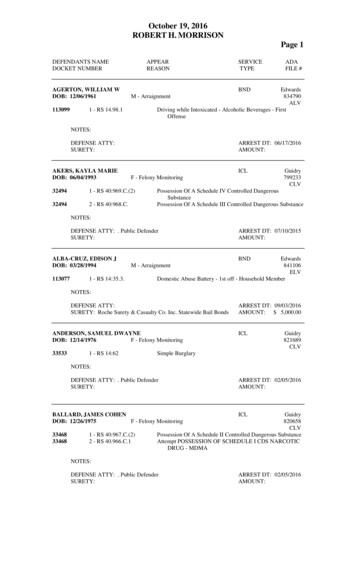
Transcription
D ECEMBER 2 0 2 034567STUDY ARTICLES FOR:FEBRUARY 1-28, 2021
STUDYARTICLE49The Resurrection—A Sure Hope!SONG 151He Will CallPREVIEWFirst Corinthians chapter 15 focuses on theresurrection. Why is thatteaching important to us,and why can we have confidence that Jesus wasresurrected? This articlewill address these andother important questionsabout the resurrection.“I have hope toward God . . . that there is going to bea resurrection.”—ACTS 24:15.HOPE is very important. The hope of some people centers on having a successful marriage, raising healthy children, or recovering from a serious illness. We Christiansmay long for the same things. But the hope we cherishmost goes further than that; it includes our everlastingfuture as well as the future of our loved ones who havedied.2 The apostle Paul stated: “I have hope toward God . . .that there is going to be a resurrection of both the righteous and the unrighteous.” (Acts 24:15) Paul was notthe first to express the hope of a resurrection. The patriarch Job did too. He was confident that God would remember him and raise him to life again.—Job 14:7-10,12-15.3 “The resurrection of the dead” is part of the “foundation,” or “primary doctrine,” of all Christian teachings.(Heb. 6:1, 2) Paul’s discussion of the resurrection is recorded in 1 Corinthians chapter 15. What he wrote musthave built up first-century Christians. And that chaptercan build us up and strengthen a hope that we may havelong held.4 The resurrection of Jesus Christ is key to our hope forour dead loved ones. It was part of “the good news” thatPaul declared to the Corinthians. (1 Cor. 15:1, 2) In fact,he said that if a Christian lacked belief in that resurrec1-2. True worshippers have what wonderful hope?3. Why can we benefit from 1 Corinthians chapter 15?4. What is key to our hope for our dead loved ones?2
Our hope in the resurrection is linkedto the resurrection of Jesus, so we needto be convinced that Jesus was resurrected. Why can we be certain that Jehovah brought Jesus back to life?8 There were many eyewitnesses whotestified that Jesus had been raised.(1 Cor. 15:5-7) The first witness on Paul’slist was the apostle Peter (Cephas). Agroup of disciples confirmed that Pe-ter saw the resurrected Jesus. (Luke 24:33, 34) In addition, “the Twelve,” theapostles, saw Jesus after he was raised.Then Christ “appeared to more than500 brothers at one time,” perhaps atthe joyous event in Galilee mentioned atMatthew 28:16-20. Jesus also “appearedto James,” likely Jesus’ half brother,who previously had not put faith in Jesus as the Messiah. (John 7:5) After seeing the resurrected Jesus, James wasconvinced. Significantly, about 55 C.E.when Paul wrote this letter, many eyewitnesses of the resurrection were alive, soany doubter could consult with living,credible witnesses.9 Later, Jesus appeared to Paul himself. (1 Cor. 15:8) Paul (Saul) was onhis way to Damascus when he heard thevoice of the resurrected Jesus and saw avision of him in heavenly glory. (ReadActs 9:3-5.) Paul’s experience added tothe evidence that Jesus’ resurrectionwas not a myth.—Acts 26:12-15.10 Paul’s testimony would be especially noteworthy to some because he atone time persecuted Christians. Oncehe became convinced that Jesus hadbeen raised up, Paul labored to convinceothers of this truth. He endured beatings, imprisonment, and shipwreck as hespread the truth that Jesus had died butwas alive again. (1 Cor. 15:9-11; 2 Cor.11:23-27) Paul was so sure that Jesushad been raised from the dead that hewas willing to die defending his belief.Does this early testimony not convince5-6. What do the words found at 1 Corinthians 15:3, 4 mean for us?7-8. What helps Christians to be sure that Jesuswas resurrected?9. As we read at Acts 9:3-5, how could Paul addtestimony about Jesus’ resurrection?10. What did Paul’s conviction that Jesus wasraised from the dead move him to do?tion, his faith would be useless. (1 Cor.15:17) Belief in the resurrection of Jesusis central to our Christian hope.5 Early in Paul’s discussion of the resurrection, he brought up three realities.They are (1) “Christ died for our sins.”(2) He “was buried.” (3) He “was raisedup on the third day according to theScriptures.”—Read 1 Corinthians 15:3, 4.6 What do Jesus’ death, burial, and resurrection mean for us? The prophet Isaiah foretold that the Messiah would be“cut off from the land of the living” andbe “given a burial place with the wicked.”More was involved, though. Isaiah addedthat the Messiah would carry “the sin ofmany people.” Jesus did this by providing the ransom. (Isa. 53:8, 9, 12; Matt.20:28; Rom. 5:8) So the death, burial,and resurrection of Jesus provide a solidbasis for our hope of being set free fromsin and death and being reunited withour loved ones who have died.TESTIMONY FROMMANY WITNESSES7DECEMBER 20203
Jesus was the first of manyto be raised from death toheavenly life(See paragraphs 15-16)
you that Jesus was raised from the dead?And does it not strengthen your belief inthe resurrection?ADDRESSING WRONG VIEWSSome in the Greek city of Corinthhad wrong views about the resurrection,even going so far as to say that “thereis no resurrection of the dead.” Why?(1 Cor. 15:12) Philosophers in another Greek city, Athens, had mocked theidea that Jesus was resurrected. Suchthinking may have affected some in Corinth. (Acts 17:18, 31, 32) Others mayhave thought of the resurrection in afigurative sense, meaning that a personwas once “dead” in sin but had become“alive” as a Christian. Whatever theirreason, denying the resurrection meantthat their faith was in vain. If God didnot resurrect Jesus, no ransom was paidand all remained in sin. So those whorejected the resurrection had no validhope.—1 Cor. 15:13-19; Heb. 9:12, 14.12 Paul had firsthand knowledge that“Christ [had] been raised from thedead.” That resurrection was superior tothe resurrection of those who had earlier been brought back to life on earth—only to die again. Paul said that Jesuswas “the firstfruits of those who havefallen asleep in death.” In what sense wasJesus first? He was the first person to beraised to life as a spirit being and the firstone from mankind to ascend to heaven.—1 Cor. 15:20; Acts 26:23; read 1 Peter3:18, 22.1111. Why may some in Corinth have had wrongviews about the resurrection?12. In line with 1 Peter 3:18, 22, how did Jesus’ resurrection differ from earlier ones?THOSE WHO“WILL BE MADE ALIVE”How could the death of one manbring life to millions? Paul gives a logical answer to that question. He draws acontrast between what Adam brought onmankind and what is possible throughChrist. With regard to Adam, Paulwrote: “Death came through a man.”When Adam sinned, he brought disaster on himself and his descendants. Westill feel the tragic effects of his disobedience. How different is the outcome made possible because God raisedhis Son! “Resurrection of the dead alsocomes through a man,” Jesus. “For justas in Adam all are dying,” Paul reasoned,“so also in the Christ all will be madealive.”—1 Cor. 15:21, 22.14 What did Paul mean when he saidthat “in Adam all are dying”? Paul had inmind Adam’s descendants, who inherited sin and imperfection from Adam andthus are in a dying condition. (Rom. 5:12) Adam is not among those who “willbe made alive.” Christ’s ransom does notcover him, for Adam was a perfect manwho willfully disobeyed God. The outcome for Adam is the same as what isahead for those whom “the Son of man”will judge as “goats,” namely, “everlasting cutting-off.”—Matt. 25:31-33, 46;Heb. 5:9.15 Note that Paul said that “in the Christall will be made alive.” (1 Cor. 15:22)Paul’s letter was written to anointed1313. Paul drew what contrast between Adam andJesus?14. Will Adam be resurrected? Explain.15. Who are included in the “all” who “will be madealive”?DECEMBER 20205
Putting trust in theresurrection allows usto look to the futurewith confidence(See paragraph 20)Christians in Corinth, who would be resurrected to life in heaven. Those Christians were “sanctified in union withChrist Jesus, called to be holy ones.”AndPaul mentioned “those who have fallen asleep in death in union with Christ.”(1 Cor. 1:2; 15:18; 2 Cor. 5:17) In another inspired letter, Paul wrote that those“united with [Jesus] in the likeness of hisdeath” will “be united with him in thelikeness of his resurrection.” (Rom. 6:3-5) Jesus was raised as a spirit and wentto heaven. So that will be the outcomefor all “in union with Christ,” that is, allspirit-anointed Christians.16 Paul wrote that Christ was raised as“the firstfruits of those who have fallenasleep in death.” Bear in mind that others, such as Lazarus, had been broughtback to life on earth, but Jesus was thefirst one ever to be raised from the deadas a spirit and to receive everlasting life.He could be likened to the firstfruitsof the harvest that the Israelites offeredto God. Furthermore, by calling Jesus“the firstfruits,” Paul implied that others16. What did Paul imply by calling Jesus “the firstfruits”?6THE WATCHTOWERthereafter would be raised from death toheavenly life. The apostles and others “inunion with Christ” would follow Jesus.In due time, they would experience a resurrection similar to that of Jesus.17 The heavenly resurrection for those“in union with Christ” had not yet begunto occur at the time Paul wrote to theCorinthians. Rather, Paul pointed to afuture time: “Each one in his own proper order: Christ the firstfruits, afterwardthose who belong to the Christ duringhis presence.” (1 Cor. 15:23; 1 Thess. 4:15, 16) Today we are living during thatforetold “presence” of Christ. Yes, theapostles and other spirit-anointed Christians who died had to await that presence to receive their heavenly rewardand be “united with [Jesus] in the likeness of his resurrection.”YOU HAVE A SURE HOPE!18What, though, of all the loyal Chris-17. When would those “in union with Christ” receive their heavenly reward?18. (a) Why can we conclude that another resurrection will follow the heavenly one? (b) As indicated at 1 Corinthians 15:24-26, what developmentswill occur in heaven?
tians who do not have the hope of livingin heaven with Christ? They too have thehope of a resurrection. The Bible saysthat Paul and others who go to heavenshare in “the earlier resurrection fromthe dead.” (Phil. 3:11) Does that not suggest that another resurrection would follow? That would be in harmony withwhat Job said about his future. (Job14:15) “Those who belong to the Christduring his presence” will be in heavenwith Jesus when he brings to nothing allgovernments and all authority and power. Even “the last enemy, death,” will bebrought to nothing. Certainly, inheriteddeath will no more afflict those raised toheaven. But what about others?—Read1 Corinthians 15:24-26.19 What can those with an earthly hopeexpect? They can derive hope fromPaul’s words: “I have hope . . . that thereis going to be a resurrection of both therighteous and the unrighteous.” (Acts24:15) Clearly, no unrighteous personcan enter into heaven, so those wordspoint to a future resurrection on earth.19. What can those with an earthly hope expect?Without a doubt, “there is goingto be a resurrection”! Those who arebrought back to life on earth will havethe prospect of living here forever. Youcan put your trust in that promise.That hope can bring you comfort regarding your loved ones who have died.They can be raised from the dead during the time when Christ and others will“rule as kings . . . for the 1,000 years.”(Rev. 20:6) You too can maintain thesure hope that if you should happen todie before the Millennium begins, yourfuture is secure. This “hope does notlead to disappointment.” (Rom. 5:5) Itcan sustain you now and add to your joyin serving God. But there is more that wecan learn from 1 Corinthians chapter 15,as the following article will show.2020. How has your hope been strengthened?PICTURE DESCRIPTIONS Page 4: Jesus was thefirst to be taken to heaven. (Acts 1:9) Some of hisdisciples who would join him there included Thomas, James, Lydia, John, Mary, and Paul. Page 6:A brother has lost his beloved wife, with whom hehad long served. He trusts that she will be resurrected, and he continues to serve Jehovah loyally.HOW WOULD YOU ANSWER? What evidence canyou point to that Jesuswas resurrected? Why is the fact thatJesus was raised soimportant to us? How does 1 Corinthianschapter 15 strengthen yourfaith in the resurrection?SONG 147Life Everlasting Is Promised
STUDYARTICLE50“How Are the Deadto Be Raised Up?”SONG 141“Death, where is your victory? Death, where is your sting?”The Miracle of Life—1 COR. 15:55.PREVIEWMOST people now serving Jehovah hope to live foreveron earth. A remnant of spirit-anointed Christians, however, hope to be raised to life in heaven. These anointedones are keenly interested in what their future life will belike, but what about those with the earthly hope? As wewill see, the heavenly resurrection will lead to blessingsalso for those who have the hope of living forever onearth. So regardless of whether our hope is heavenlyor earthly, we should be interested in the heavenly resurrection.2 God inspired some of Jesus’ disciples in the first century to write about the heavenly hope. The apostle Johnexplained: “We are now children of God, but it has notyet been made manifest what we will be. We do know thatwhen he is made manifest we will be like him.” (1 John3:2) So anointed Christians do not know what they willbe like when they are raised to heaven with spirit bodies.However, they will in a literal sense see Jehovah whenthey receive their reward. The Bible does not revealevery detail about the heavenly resurrection, but theapostle Paul did provide some information about it. Theanointed will be with Christ when he brings “to nothingall government and all authority and power.” That includes “the last enemy, death.” Finally, Jesus—alongThe second half of 1 Corinthians chapter 15 contains details about theresurrection, especiallythat of anointed Christians. However, what Paulwrote is also of interest tothose of the other sheep.This article will show howthe hope of the resurrection should affect our lifenow and give us reason tolook forward to the future.1-2. Why should all Christians be interested in the heavenly resurrection?8
with his corulers—will subject himselfand all things to Jehovah. (1 Cor. 15:2428) What a climax that will be!13 Paul’s belief in the resurrectionhelped him to endure various trials.(Read 1 Corinthians 15:30-32.) Hetold the Corinthians: “Daily I facedeath.” Paul also wrote: “I have foughtwith wild beasts at Ephesus.” Perhaps hewas alluding to his fighting real animalsat an arena in Ephesus. (2 Cor. 1:8; 4:10; 11:23) Or he may have been referring to hostile Jews and others who werelike “wild beasts.” (Acts 19:26-34; 1 Cor.16:9) Whichever it was, Paul faced serious perils. Yet, he still had a positive outlook on the future.—2 Cor. 4:16-18.4 We are living in dangerous times.Some of our brothers have been victimsof crime. Others live in war-torn areaswhere their safety is far from guaranteed. Still others serve Jehovah at therisk of their life or freedom in landswhere the preaching work is restrictedor even banned. Yet, all these brothersand sisters persevere in their worshipof Jehovah, becoming examples for us.They are secure in the knowledge thateven if they lose their life at the presenttime, Jehovah has something far betterin mind for them in the future.5 Paul warned his brothers about a1 “Questions From Readers” in this issue addressesPaul’s comments found at 1 Corinthians 15:29.3. As indicated at 1 Corinthians 15:30-32, Paul’sbelief in the resurrection helped him to do what?4. How has the hope of the resurrection strengthened Christians today? (See cover picture.)5. What dangerous viewpoint could weaken ourfaith in the resurrection?dangerous viewpoint that some had:“If the dead are not to be raised up, ‘letus eat and drink, for tomorrow we areto die.’” That viewpoint actually existed even before Paul’s day. He may havebeen quoting Isaiah 22:13, which refersto the attitude of the Israelites. Insteadof drawing close to God, they pursued alife of pleasure. Basically, the attitude ofthose Israelites was “here today, gonetomorrow,” a view common even today.However, the bad outcome to the nationof Israel is a matter of record.—2 Chron.36:15-20.6 Clearly, the fact that Jehovah canresurrect the dead should affect ourchoice of associates. The brothers inCorinth needed to guard against associating with those who denied the resurrection. There is a lesson for us today:No good can come from choosing as regular associates those who have a livefor-the-moment outlook. Being withsuch ones can ruin a true Christian’sviewpoint and habits. In fact, it mightlead him to have a lifestyle that includeswhat God hates—sin. Thus, Paul strongly urged: “Come to your senses in arighteous way and do not practice sin.”—1 Cor. 15:33, 34.WHAT SORT OF BODY?Read 1 Corinthians 15:35-38. Aninquirer who wanted to cast doubton the resurrection might have asked:“How are the dead to be raised up?” We76. How should the resurrection hope affect ourchoice of associates?7. What question about the resurrection mightsome have asked, as shown at 1 Corinthians15:35-38?DECEMBER 20209
do well to consider Paul’s answer because many people today have personalviews about life after death. But whatdoes the Bible teach?8 When someone dies, his body decomposes. But the One who createdthe universe from nothing can resurrectthat person, giving him a suitable body.(Gen. 1:1; 2:7) Paul used an illustrationto show that God would not need tobring back the same body. Think of “abare grain,” or a plant “seed.” A seed ofgrain that is planted in the ground germinates and becomes a new plant. Theresulting plant is quite different fromthe small seed. Paul used this comparison to show that our Creator can provide “a body just as it [pleases] him.”9 Read 1 Corinthians 15:39-41. Paul8. What illustration can help us to understand theresurrection to heavenly life?9. As to bodies, 1 Corinthians 15:39-41 calls attention to what differences?10THE WATCHTOWERnoted that there is great diversity increation. For example, there are different fleshly bodies, such as cattle, birds,and fish. He stated that in the sky, wesee differences between the sun and themoon. And he noted that “one star differs from another star in glory.” Yes,even if we may not discern it with thenaked eye, there are what scientists callred giant stars, white dwarfs, and yellowstars, such as our sun. Paul also stated that “there are heavenly bodies andearthly bodies.” How so? Well, on earth,we have bodies of flesh, but in heaventhere are spirit bodies, like the ones theangels have.10 Note what Paul said next: “So it iswith the resurrection of the dead. It issown in corruption; it is raised up in incorruption.” Of course, upon dying, the10. How might differences in bodies relate to theresurrection?
Using a seed and a plant,Paul illustrated that Godcan provide a suitablebody for those who areresurrected(See paragraph 8)human body decays and returns to thedust. (Gen. 3:19) So how can it be thata body is “raised up in incorruption”?Paul was not speaking of a human whois resurrected to life on earth, such asthose raised by Elijah, Elisha, and Jesus.Paul was referring to a person who is resurrected with a heavenly body, that is, “aspiritual one.”—1 Cor. 15:42-44.11 When Jesus walked the earth, hehad a fleshly body. But when he wasresurrected, he “became a life-givingspirit” and returned to heaven. Likewise, anointed Christians would be resurrected to spirit life. Paul explained:“Just as we have borne the image ofthe one made of dust, we will bear alsothe image of the heavenly one.”—1 Cor.15:45-49.12 Paul was reaching the climax of his11-12. What change did Jesus experience when hewas resurrected, and how do the anointed experience something similar?discussion of the resurrection. It is important to note that Jesus was not resurrected with a human body. Paul pointedly said: “Flesh and blood cannot inheritGod’s Kingdom” in heaven. (1 Cor. 15:50) The apostles and other anointedones would not be resurrected to heaven with corruptible bodies of flesh andblood. When would they be resurrected? Paul stressed that this resurrectionstill lay ahead; it was not somethingthey would experience right after theydied. By the time Paul wrote 1 Corinthians, some disciples had already “fallenasleep in death,” for example, the apostle James. (Acts 12:1, 2) Other apostlesand anointed ones would yet fall “asleepin death.”—1 Cor. 15:6.VICTORY OVER DEATHBoth Jesus and Paul pointed forwardto a special time in history—Christ’s1313. How would Jesus’ presence be marked?DECEMBER 202011
Those who are changed“in the blink of an eye”will share with Jesus insmashing the nations(See paragraph 15)12presence. That presence would bemarked by wars, earthquakes, pestilences, and other global developments.We have seen this Bible prophecy being fulfilled since 1914. There would beanother outstanding part of that sign.Jesus said that the good news of God’sestablished Kingdom would be preached“in all the inhabited earth for a witness to all the nations, and then theend [would] come.” (Matt. 24:3, 7-14)Paul pointed out that “the presence ofthe Lord” would also be a time of resurrection for anointed Christians who had“fallen asleep in death.”—1 Thess. 4:1416; 1 Cor. 15:23.14 Anointed ones who today finishtheir earthly course are instantly raisedto life in the heavens. This is confirmedby Paul’s words recorded at 1 Corinthians 15:51, 52: “We will not all fall asleepin death, but we will all be changed,in a moment, in the blink of an eye,during the last trumpet.” These wordsof Paul are now undergoing fulfillment!Upon their resurrection, these brothersof Christ will have complete joy; theywill “always be with the Lord.”—1 Thess.4:17.15 The Bible tells us what work thosewho are changed “in the blink of an eye”will do in heaven. Jesus says to them:“To the one who conquers and observesmy deeds down to the end, I will giveauthority over the nations, and he willshepherd the people with an iron rod so14. What do anointed ones who pass away duringChrist’s presence experience?15. What work awaits those who will be changed“in the blink of an eye”?THE WATCHTOWER
that they will be broken to pieces likeclay vessels, just as I have received frommy Father.”(Rev. 2:26, 27) They will follow their Commander in the task at hand—shepherding the nations with a rod ofiron.—Rev. 19:11-15.16 Clearly, the anointed will be victorious over death. (1 Cor. 15:54-57) Theirresurrection will put them in positionto share in the victory over earth-widewickedness during the coming war ofArmageddon. Millions of other Christian men and women will “come out ofthe great tribulation,” surviving into thenew world. (Rev. 7:14) Those survivorson earth will be eyewitnesses to anothervictory over death—the resurrection ofbillions of people who died in the past.Just imagine the joy when that victori-ous event occurs! (Acts 24:15) And allthose who prove completely loyal to Jehovah will be victorious even over inherited death. They will be able to live forever.17 Every Christian now alive should begrateful for the reassuring words thatPaul wrote to the Corinthians regarding the resurrection. We have every reason to show that we accept Paul’s urgingto be fully occupied now “in the workof the Lord.” (Read 1 Corinthians 15:58.) If we loyally and actively share inthat work, we will put ourselves in lineto experience a future filled with joy.That future will be more wonderful thananything we can imagine. It certainlywill confirm that our labor has not beenin vain in connection with the Lord.16. How will many humans be victorious overdeath?17. With 1 Corinthians 15:58 in mind, what shouldwe do now?HOW WOULD YOU ANSWER? As we face perils, howshould the resurrectionhope affect us? What share will those whoare changed “in the blink ofan eye” have with Christ? Why is the counsel foundat 1 Corinthians 15:58appropriate for us today?SONG 140Life Without End—At Last!
QUESTIONS FROM READERSDo the apostle Paul’s words found at 1 Corinthians 15:29 mean thatsome Christians back then got baptized on behalf of dead people?ˇ No, neither the Bible nor history indicatesthat such was done.The way that this text reads in many Bibleshas led some to think that water baptism onbehalf of the dead was carried out in Paul’sday. For example: “Now if there is no resurrection, what will those do who are baptizedfor the dead?”—New International Version.However, note the comments of two Biblescholars. Dr. Gregory Lockwood said thatthe idea that baptisms were performed “onbehalf of persons who had already died”would be “a form of baptism, which as far ascan be determined, was without historical orbiblical parallel.” Similarly, Professor GordonD. Fee wrote: “There is no historical or biblical precedent for such baptism. The N[ew]T[estament] is otherwise completely silentabout it; there is no known practice in anyof the other churches nor in any orthodoxChristian community in the centuries thatimmediately follow.”The Bible says that Jesus’ followers wereto “make disciples of people of all the nations, baptizing them . . . , teaching them toobserve all the things” he had commanded.(Matt. 28:19, 20) Before a person could become a baptized disciple, he needed to learnabout, believe in, and obey Jehovah and HisSon. Someone who was already dead and inthe grave could not do that; nor could a living Christian do it for him.—Eccl. 9:5, 10;John 4:1; 1 Cor. 1:14-16.What, then, was Paul saying?Some Corinthians denied that the deadwould be resurrected. (1 Cor. 15:12) Paul14THE WATCHTOWERrefuted that view. He pointed out that he‘daily faced death.’ Of course, he was stillalive. But despite experiencing dangers, hewas confident that after death he would beresurrected as a powerful spirit, even asJesus was.—1 Cor. 15:30-32, 42-44.The Corinthians needed to realizethat being anointed Christians meant thatthey would face daily trials and die beforethey could be resurrected. Being “baptizedinto Christ Jesus” involved being “baptizedinto his death.” (Rom. 6:3) Their figurativebaptism resulted in a course that would leadto their literal death and resurrection toheaven.More than two years after Jesus got baptized in water, he told two of his apostles:“With the baptism with which I am beingbaptized, you will be baptized.” (Mark 10:38,39) Jesus was not then being baptizedin water. He meant that his ongoing courseof integrity would lead to his actual death.Paul wrote that anointed ones would “suffertogether so that [they might] also be glorified together.” (Rom. 8:16, 17; 2 Cor. 4:17)So they too would have to die to be resurrected to life in heaven.Accordingly, Paul’s statement can accurately be rendered: “Otherwise, what willthey do who are being baptized for the purpose of being dead ones? If the dead are notto be raised up at all, why are they also being baptized for the purpose of being such?”
Proverbs 24:16 says: “The righteous one may fall seven times, and he willget up again.” Does this refer to someone who repeatedly falls into sin butthen is forgiven by God?ˇ Actually, that is not the point of this verse.Rather, it refers to someone who falls in thesense of repeatedly facing problems or adversities and who gets up again in the senseof being able to recover.Consider the verse in context: “Do notwickedly lie in ambush near the home ofthe righteous one; do not destroy his placeof rest. For the righteous one may fall seven times, and he will get up again, but thewicked will be made to stumble by calamity. When your enemy falls, do not rejoice,and when he stumbles, do not let your heartbe joyful.”—Prov. 24:15-17.Some have held that verse 16 appliesto a person who may fall into sin but can recover. Two British clerics wrote that “preachers, ancient and modern, have made muchuse of this text” in that way. The clerics added that such a view means that “a good manmay fall into . . . serious sins, but he neverloses his love of God, and rises from his fallby repentance on every occasion.” Such anopinion could appeal to someone who doesnot want to resist sin. He might imagine thateven if he sins repeatedly, God will alwaysforgive him.That misses the real sense of verse 16.The Hebrew word rendered “fall” and“falls” in verses 16 and 17 can be used invarious ways. It can mean a literal fall—a bullfalls on the road, someone falls off a roof, ora pebble falls to the ground. (Deut. 22:4, 8;Amos 9:9) The word can also be used figuratively, as in the following: “Jehovah guidesthe steps of a man when He finds pleasure inhis way. Although he may fall, he will not behurled down, for Jehovah supports him bythe hand.”—Ps. 37:23, 24; Prov. 11:5; 13:17;17:20.However, note a point made by ProfessorEdward H. Plumptre: “The Hebrew word for[“fall”] is never used of falling into sin.”Hence, another scholar summarizes verse 16this way: “It would be futile and selfdefeating to mistreat God’s people, for theysurvive—the wicked do not!”Yes, rather than speak of “falling” inthe moral sense of falling into sin, Proverbs24:16 refers to experiencing problems or difficulties, even repeatedly. In the presentwicked system of things, a righteous onemay face health or other problems. He mayeven be the object of intense governmentalpersecution. But he can trust that God is hissupport and will help him to cope and succeed. Ask yourself, ‘Have I not seen thatthings often work out well for God’s servants?’ Why? We are assured that “Jehovah supports all who are falling and raisesup all who are bowed down.”—Ps. 41:1-3;145:14-19.“The righteous one” does not find comfortin the reality that others are having problems. Rather, he is comforted in the knowledge that “it will turn out well for those whofear the true God, because they fear him.”—Eccl. 8:11-13; Job 31:3-6; Ps. 27:5, 6.DECEMBER 202015
STUDYARTICLE51“Jehovah . . . Saves ThoseWho
7-8. What helps Christians to be sure that Jesus was resurrected? ter saw the resurrected Jesus. (Luke 24: 33, 34) In addition, "the Twelve," the apostles, saw Jesus after he was raised. Then Christ "appeared to more than 500 brothers at one time," perhaps at thejoyouseventin Galileementioned at Matthew28:16-20. Jesus also"appeared










